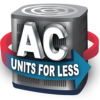For any business owner, selecting a commercial HVAC system is an important decision. It affects employee comfort, productivity, energy costs, and even brand image. Among the three top competitors in this field are Trane, Carrier, and Daikin. In this article, we are going to look into some of their main characteristics so you can make a better-informed decision.
Trane vs Carrier vs Daikin Commercial HVAC Units
Trane:
Reputation: Trane systems are recognized for their durability and reliability, and with good reason. They're often accompanied by longer warranties and come with lower costs of ownership over the life of the car since that means fewer repairs.
Efficiency: With some of the highest efficiency models on the market, Trane performance systems can reach up to 20 SEER and feature variable speed technology. This can mean hundreds of dollars in electrical savings over the life of the unit.
Innovation: Trane is being really innovative, they are continue investing in R&D to provide a more advanced technology like IntelliPak rooftop units and smart controls.
Cost: Trane is a high-end brand, and its units come with a price premium.
👉 Explore Trane Commercial HVAC Systems available at AC Units for Less.
Carrier:
Portability: Carrier has multiple systems to fit different types of buildings and budgets. Enhancements ranging from rooftop units to packaged systems ensure that they include an item for essentially every demand.
Sustainability: Carrier is a manufacturer of sustainable solutions, offering environmentally-friendly refrigerants and geothermal heat pumps. Smart Building Technologies Integration.
Availability: With their large network of dealers and service providers, support is easy to find, as are skilled installers.
Price: Carrier pricing is clearly a mid-ranger, providing acceptable levels of affordability with good quality.
Daikin:
Affordable: One of the big selling points for Daikin is that you get high-quality solutions without breaking the bank. They have stock systems, good and priced for competition.
Two Stage Compressor: Daikin has an advanced inverter-driven compressor technology that can change the stage and provide noiseless working with increased efficiency. They also have VRV system for multi-zone climate control systems.
Worldwide Reach: One of Daikin's great assets is that they are a worldwide company with various international manufacturing sites, so we can expect consistency in the level of quality and customer support everywhere.
Less Availability: Daikin doesn't have as big dealer network in some areas compared to the top two.
👉 View Daikin Mini Split Systems for efficient commercial solutions.
The Ruling:
The "Best" brand will boil down to a matter of your personal needs and preferences.
Trane: The down and dirty high-end reliability & performance; you can order one with a credit card.
Carrier: Carrier would be a good pick for those sticking to budget but still wanting something versatile and that offers lateral support.
Daikin: This makes Daikin a good fit for you if you are looking for value-driven, technology-focused solutions.
In the end, you should work with experienced HVAC professionals who will offer a relative price list and compare the models that best suit your building with cost tariffs. Be sure to choose a reputable installer, as a new system will only perform as good as the quality of installation that is done, no matter what brand you may pick.
Final thoughts:
- Take into account things like the size of the building, climate, local regulations, and occupancy.
- Check warranty terms and services.
- Obtain multiple quotes and haggle for the best price.
- Select a certified contractor with expertise in your trade.
With the right research and due diligence, you can make your commercial HVAC system everything that it needs to be - efficient, comfortable, and a genuine investment in your business.
FAQs
- How does Daikin Compare to Other Brands
Daikin stands out in the commercial HVAC space with advanced inverter-driven systems, multi-zone VRV technology, and a strong focus on energy efficiency and quiet performance. It offers reliable, high-quality solutions that compete closely with other leading brands in terms of innovation and overall value.



